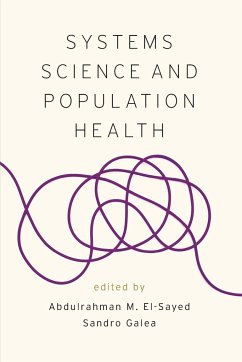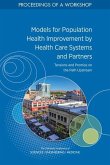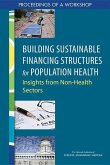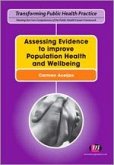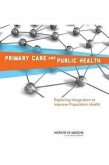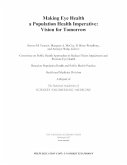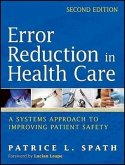Systems Science and Population Health
Herausgeber: El-Sayed, Abdulrahman M; Galea, Sandro
Systems Science and Population Health
Herausgeber: El-Sayed, Abdulrahman M; Galea, Sandro
- Broschiertes Buch
- Merkliste
- Auf die Merkliste
- Bewerten Bewerten
- Teilen
- Produkt teilen
- Produkterinnerung
- Produkterinnerung
SYSTEMS SCIENCE AND POPULATION HEALTH employs principles from across a range of sciences to refine the way we understand population health. By augmenting traditional analytic approaches with new tools like machine learning, microsimulation, and social network analysis, population health can be studied as a dynamic and complex system. This allows us to understand population health as a complex whole, offering new insights and perspectives that stand to improve the health of the public. This text offers the first educational and practical guide to this forward-thinking approach.
Andere Kunden interessierten sich auch für
![Models for Population Health Improvement by Health Care Systems and Partners Models for Population Health Improvement by Health Care Systems and Partners]() National Academies of Sciences Engineering and MedicineModels for Population Health Improvement by Health Care Systems and Partners49,99 €
National Academies of Sciences Engineering and MedicineModels for Population Health Improvement by Health Care Systems and Partners49,99 €![Building Sustainable Financing Structures for Population Health Building Sustainable Financing Structures for Population Health]() National Academies of Sciences Engineering and MedicineBuilding Sustainable Financing Structures for Population Health53,99 €
National Academies of Sciences Engineering and MedicineBuilding Sustainable Financing Structures for Population Health53,99 €![Assessing Evidence to Improve Population Health and Wellbeing Assessing Evidence to Improve Population Health and Wellbeing]() Assessing Evidence to Improve Population Health and Wellbeing54,99 €
Assessing Evidence to Improve Population Health and Wellbeing54,99 €![Primary Care and Public Health Primary Care and Public Health]() Institute Of MedicinePrimary Care and Public Health49,99 €
Institute Of MedicinePrimary Care and Public Health49,99 €![Making Eye Health a Population Health Imperative Making Eye Health a Population Health Imperative]() National Academies of Sciences Engineering and MedicineMaking Eye Health a Population Health Imperative127,99 €
National Academies of Sciences Engineering and MedicineMaking Eye Health a Population Health Imperative127,99 €![Global Population and Reproductive Health Global Population and Reproductive Health]() Deborah R McFarlaneGlobal Population and Reproductive Health159,99 €
Deborah R McFarlaneGlobal Population and Reproductive Health159,99 €![Error Reduction in Health Care Error Reduction in Health Care]() Error Reduction in Health Care96,99 €
Error Reduction in Health Care96,99 €-
-
-
SYSTEMS SCIENCE AND POPULATION HEALTH employs principles from across a range of sciences to refine the way we understand population health. By augmenting traditional analytic approaches with new tools like machine learning, microsimulation, and social network analysis, population health can be studied as a dynamic and complex system. This allows us to understand population health as a complex whole, offering new insights and perspectives that stand to improve the health of the public. This text offers the first educational and practical guide to this forward-thinking approach.
Produktdetails
- Produktdetails
- Verlag: Cold Spring Harbor Laboratory Press
- Seitenzahl: 240
- Erscheinungstermin: 1. März 2017
- Englisch
- Abmessung: 233mm x 156mm x 20mm
- Gewicht: 345g
- ISBN-13: 9780190492397
- ISBN-10: 0190492392
- Artikelnr.: 47867209
- Verlag: Cold Spring Harbor Laboratory Press
- Seitenzahl: 240
- Erscheinungstermin: 1. März 2017
- Englisch
- Abmessung: 233mm x 156mm x 20mm
- Gewicht: 345g
- ISBN-13: 9780190492397
- ISBN-10: 0190492392
- Artikelnr.: 47867209
Abdulrahman M. El-Sayed, MD, DPhil, is a public health physician and epidemiologist. He serves the City of Detroit as the Executive Director of the Detroit Health Department and Health Officer. Under his leadership, the Detroit Health Department has emerged as a state and national leader in promoting healthy air quality, lead elimination, and public health innovation. Dr. El-Sayed's research explores urban health policy, the social determinants of health, and health inequalities. Previously, he was a professor in the Department of Epidemiology at Columbia University. Sandro Galea, MD, DrPH, is a physician and an epidemiologist interested in the social production of health of urban populations. His work explores innovative cells-to-society approaches to population health questions. He is interested in advancing a consequentialist approach to population health scholarship. He currently serves as Robert A. Knox Professor and Dean of the School of Public Health at Boston University. He is a past president of the Society for Epidemiologic Research, and an elected member of the National Academy of Medicine. Together they have been engaged in systems science scholarship and education for more than 15 years.
1.Introduction
Abdulrahman M. El-Sayed
SECTION 1: Simplicity, complexity and population health
2. Reductionism at the dawn of population health
Kristin Heitman
3. Wrong answers: when simple interpretations create complex problems
David S. Fink, Katherine M. Keyes
4. Complexity: the evolution towards 21st century science
Anton Palma, David W. Lounsbury
5. Systems thinking in population health research and policy
Stephen Mooney
SECTION 2: Methods in systems population health
6. Generation of systems maps: mapping complex systems of population health
Helen de Pinho
7. Systems dynamics models
Eric Lofgren
8. Agent-based modeling
Brandon Marshall
9. Microsimulation
Sanjay Basu
10. Social network analysis: the ubiquity of social networks
and their importance for population health
Douglas A. Luke, Amar Dhand, Bobbi J. Carothers
SECTION 3: Systems science towards a consequential population health
11. Machine learning
James H. Faghmous
12. Systems science and the social determinants of population health
David S. Fink, Katherine M. Keyes, Magdalena Cerda
13. Systems approaches to understanding how the environment
influences population health and population health interventions
Melissa Tracy
14. Systems of behavior and population health
Mark Orr, Kathryn Ziemer, Daniel Chen
15. Systems under your skin
Karina Standahl Olsen, Hege Bovelstad, Eiliv Lund
16. Frontiers in health modeling
Nathaniel Osgood
17. Systems science and population health
Abdulrahman M. El-Sayed, Sandro Galea
Abdulrahman M. El-Sayed
SECTION 1: Simplicity, complexity and population health
2. Reductionism at the dawn of population health
Kristin Heitman
3. Wrong answers: when simple interpretations create complex problems
David S. Fink, Katherine M. Keyes
4. Complexity: the evolution towards 21st century science
Anton Palma, David W. Lounsbury
5. Systems thinking in population health research and policy
Stephen Mooney
SECTION 2: Methods in systems population health
6. Generation of systems maps: mapping complex systems of population health
Helen de Pinho
7. Systems dynamics models
Eric Lofgren
8. Agent-based modeling
Brandon Marshall
9. Microsimulation
Sanjay Basu
10. Social network analysis: the ubiquity of social networks
and their importance for population health
Douglas A. Luke, Amar Dhand, Bobbi J. Carothers
SECTION 3: Systems science towards a consequential population health
11. Machine learning
James H. Faghmous
12. Systems science and the social determinants of population health
David S. Fink, Katherine M. Keyes, Magdalena Cerda
13. Systems approaches to understanding how the environment
influences population health and population health interventions
Melissa Tracy
14. Systems of behavior and population health
Mark Orr, Kathryn Ziemer, Daniel Chen
15. Systems under your skin
Karina Standahl Olsen, Hege Bovelstad, Eiliv Lund
16. Frontiers in health modeling
Nathaniel Osgood
17. Systems science and population health
Abdulrahman M. El-Sayed, Sandro Galea
1.Introduction
Abdulrahman M. El-Sayed
SECTION 1: Simplicity, complexity and population health
2. Reductionism at the dawn of population health
Kristin Heitman
3. Wrong answers: when simple interpretations create complex problems
David S. Fink, Katherine M. Keyes
4. Complexity: the evolution towards 21st century science
Anton Palma, David W. Lounsbury
5. Systems thinking in population health research and policy
Stephen Mooney
SECTION 2: Methods in systems population health
6. Generation of systems maps: mapping complex systems of population health
Helen de Pinho
7. Systems dynamics models
Eric Lofgren
8. Agent-based modeling
Brandon Marshall
9. Microsimulation
Sanjay Basu
10. Social network analysis: the ubiquity of social networks
and their importance for population health
Douglas A. Luke, Amar Dhand, Bobbi J. Carothers
SECTION 3: Systems science towards a consequential population health
11. Machine learning
James H. Faghmous
12. Systems science and the social determinants of population health
David S. Fink, Katherine M. Keyes, Magdalena Cerda
13. Systems approaches to understanding how the environment
influences population health and population health interventions
Melissa Tracy
14. Systems of behavior and population health
Mark Orr, Kathryn Ziemer, Daniel Chen
15. Systems under your skin
Karina Standahl Olsen, Hege Bovelstad, Eiliv Lund
16. Frontiers in health modeling
Nathaniel Osgood
17. Systems science and population health
Abdulrahman M. El-Sayed, Sandro Galea
Abdulrahman M. El-Sayed
SECTION 1: Simplicity, complexity and population health
2. Reductionism at the dawn of population health
Kristin Heitman
3. Wrong answers: when simple interpretations create complex problems
David S. Fink, Katherine M. Keyes
4. Complexity: the evolution towards 21st century science
Anton Palma, David W. Lounsbury
5. Systems thinking in population health research and policy
Stephen Mooney
SECTION 2: Methods in systems population health
6. Generation of systems maps: mapping complex systems of population health
Helen de Pinho
7. Systems dynamics models
Eric Lofgren
8. Agent-based modeling
Brandon Marshall
9. Microsimulation
Sanjay Basu
10. Social network analysis: the ubiquity of social networks
and their importance for population health
Douglas A. Luke, Amar Dhand, Bobbi J. Carothers
SECTION 3: Systems science towards a consequential population health
11. Machine learning
James H. Faghmous
12. Systems science and the social determinants of population health
David S. Fink, Katherine M. Keyes, Magdalena Cerda
13. Systems approaches to understanding how the environment
influences population health and population health interventions
Melissa Tracy
14. Systems of behavior and population health
Mark Orr, Kathryn Ziemer, Daniel Chen
15. Systems under your skin
Karina Standahl Olsen, Hege Bovelstad, Eiliv Lund
16. Frontiers in health modeling
Nathaniel Osgood
17. Systems science and population health
Abdulrahman M. El-Sayed, Sandro Galea

